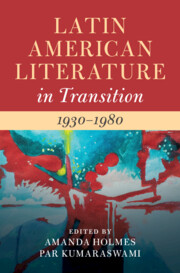Book contents
- Latin American Literature in Transition 1930–1980
- Latin American Literature in Transition
- Latin American Literature in Transition 1930–1980
- Copyright page
- Contents
- Contributors
- Introduction
- Part I War, Revolution, Dictatorship
- Part II Metropolis and Ruins
- Part III Solidarity
- Part IV Aesthetics and Innovation
- Index
Chapter 6 - Economic, Political, and Ecological Disasters: The Metropolis and Its Ruins in Latin American Poetry in the 1960s and 1970s
from Part II - Metropolis and Ruins
Published online by Cambridge University Press: 24 January 2023
- Latin American Literature in Transition 1930–1980
- Latin American Literature in Transition
- Latin American Literature in Transition 1930–1980
- Copyright page
- Contents
- Contributors
- Introduction
- Part I War, Revolution, Dictatorship
- Part II Metropolis and Ruins
- Part III Solidarity
- Part IV Aesthetics and Innovation
- Index
Summary
Pablo Neruda’s Macchu Picchu and Octavio Paz’s Tenochtitlán determine how the modern city in twentieth-century Latin American poetry is conceptualized as one shaped by its ruins. This chapter explores how these earlier visions of the city are reconsidered in Latin American poetry from the 1960s and 1970s. It analyzes Rosario Castellanos’ Poesía no eres tú (1948-71) and José Emilio Pacheco’s Irás y no volverás (1973), and how their poems about the Tlatelolco massacre shed light on how Neruda’s Macchu Picchu and Paz’s Tenochtitlán shape modern poetics and their political critique to contemporary violence. Pacheco’s allusions to the icnocuícatl in “La visión de los vencidos” and the use of multiple voices in “Manuscrito de Tlatelolco” link the political ruins of the Mexican state after the massacre to the violent legacy of its colonial past. Castellanos’ defiant response to the massacre in “Memorial de Tlatelolco” problematizes the Aztec historical past and the moral decay of the Mexican state. These poems underscore an ethical and political critique of modernity through a representation of economic, ecological, and political disasters. The urban space in ruins stirs a poetic meditation on the torn self, shaped by a society in crisis.
Keywords
- Type
- Chapter
- Information
- Latin American Literature in Transition 1930–1980 , pp. 99 - 115Publisher: Cambridge University PressPrint publication year: 2022

